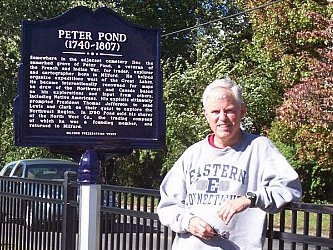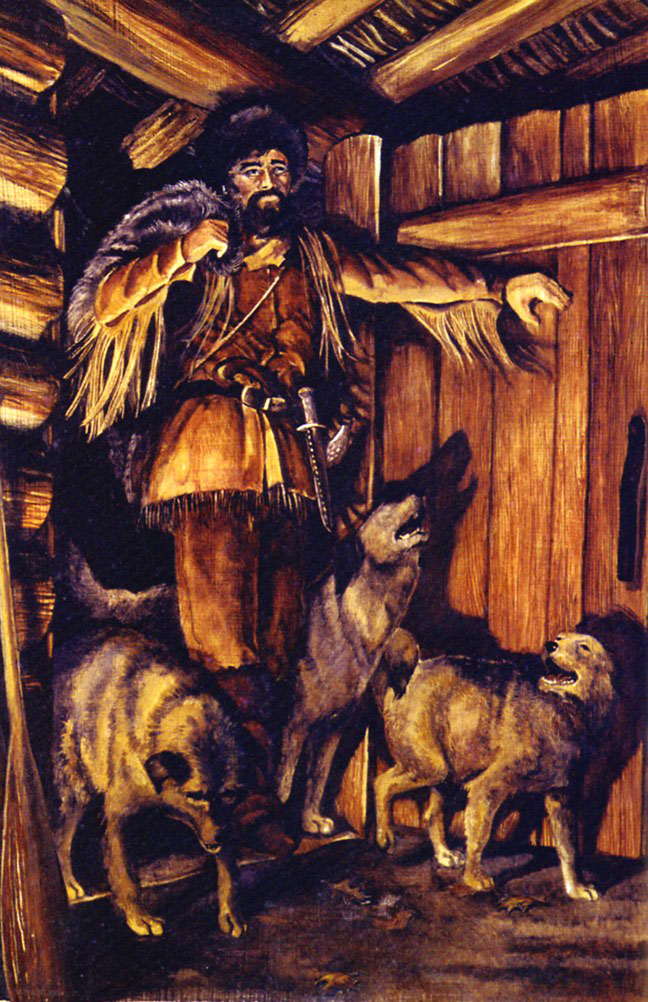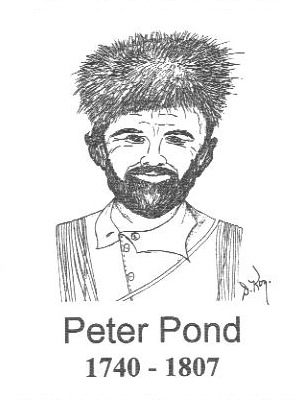Peter Pond newsletter :: February 2004 :: #18
HAPPY 2004
Happy New Year to everyone in Peter Pond Society. I hope the new year is happy and healthy for you all. Can't ask for much more.
POND KNIGHTHOOD?
The question of whether Peter Pond was ever knighted has seemed to be a puzzling one. Milford Death Records, 1802-1870, kept by Sally Fowler, record him as "Mr. Sir Peter Pond" died March 6, 1807. The first time his diary was published in Connecticut Magazine 1906, the title was "Journal of 'Sir' Peter Pond." The article that precedes the journal tells of Mrs. Nathan Gillette (Sophia) Pond asking a family member in 1868 what old manuscript she was ripping up for stove kindling, the reply being: "Why it's nothing but old 'Sir' Peter Pond's journeys. It's not worth anything. You are welcome to it." As we know, Sophia saved the diary, wrote to some Canadians including David McCord, founder of Montreal's McCord Museum, for more information after reading it. They set her straight on the magnitude of the find, and the rest is history.
I would think Innis and Wagner might have pointed out the fact that he was eventually knighted in their own works. But they did not. I thought I should check it out after reading an eight-page essay entitled "Fur Trade - New Haven" compiled by Nancy Martin in 1976, on file in the New Haven Colony Historical Society across the street from Yale University in New Haven, Conn. The first two pages are a short description of the fur trade in the nearby Connecticut River valley and fur shipments out of New Haven Harbor, which didn't last much beyond 1800. The next six pages are about the life of Peter Pond of nearby Milford who was involved in the more ambitious and wide-ranging Canadian fur trade.
The last paragraph says:
I talked to Mrs. Martin once by phone (she was a docent or volunteer at NCHS, while her husband was an anthropology professor at Yale) in the mid-1980's. She said she never got a reply from the Royal College, and didn't seem that concerned about it. Then she told an interesting story about earlier living in Edmonton, Alberta, where her husband worked at the university and she first heard of Peter Pond, resulting in her writing the paper in New Haven not far from Peter Pond's native Milford. One day she learned then Canadian Prime Minister Pierre Elliott Trudeau was due the following week to speak at Yale. She decided how nice it would be if she could find Peter Pond's grave in Milford so the PM could be brought out to say a few words over it, in light of Peter Pond's Canadian significance. Needless to say, after a three-day search around Milford, she came up with nothing and abandoned the idea.
In my own grave search, following the unsuccessful archeological dig last summer, I visited NCHS in December to look up possible probate records of Peter Pond, and found nothing. I also learned Mrs. Martin had left the area and moved back out west. So since the grave search has virtually run out of clues and ideas (see more comments later), I took another tack and did the knighthood inquiry. It was amazing how fast things came together with help of the internet and email. But snail mail had to be used in the end. Bottom line: no, he was never knighted, but there were still interesting answers to the question.
Below is a transcription of a 12/4/03 email sent to me:
Dear Mr. McDonald:
Thank you for your e-mail of 6th November, which I received as the Officer in Waiting.
I have consulted 'Knights of England' by W.A. Shaw published in 1906, and I regret to advise you that there is no Peter Pond listed as being a Knight. This is an authoritative book and lists all known Knights in England.
If Peter Pond was Canadian, it occurs to me there may be records in Ottawa.
I am sorry I have not been able to help.
Yours sincerely
Henry Bedingfeld
York Herald
The College of Arms
Queen Victoria Street
London EC4V 4BT
I asked Bedingfeld who to write to. He suggested Robert D. Watt, Chief Herald of Canada, The Canadian Heraldic Authority, Rideau Hall, Ottawa, Ontario, Canada K1AOA1.
This is the reply I received, dated December 22, 2003, which should close the book on the matter:
Dear Mr. McDonald,
The Chief Herald of Canada has asked me to respond to your question about Peter Pond. I enclose a copy of the entry under his name in the Dictionary of Canadian Biography (editor's note: written by Peter Pond Society member Barry M. Gough). There is no reference to his having been knighted, and I suspect the affectation of the title may have been one of his eccentricities.
There is quite an extensive bibliography at the end of this article, and I note that one of the biographies was written by Harold Adams Innis, the great scholar of Canada's economic history. I also see that there is an article in the Connecticut Magazine from 1906 entitled the "Journal of 'Sir' Peter Pond…", which seems to indicate that the use of the title was deemed spurious by the author.
Also from 1906 is the reference work The Knights of England, which is considered quite a reliable reference work listing all those who had received the accolade. Unless Mr. Pond had been made a knight bachelor or had been created a knight of an order of chivalry by George II or George III, he would not have been entitled to call himself "Sir". As you can see, there is no entry in this volume under Pond.
I hope this information has been helpful.
Yours sincerely,
Bruce Patterson
Saguenay Herald
HELP FOR Hide-Away Canoe Club
Shortly after returning from my July 1988 Peter Pond Pilgrimage down the Clearwater River from Saskatchewan to Alberta, I began subscribing to Che-Mun (see links). Che-Mun is Ojibway for canoe. This is a wonderful quarterly newsletter put out by Michael Peake, a fellow journalist-paddler from Toronto, on the joys with liberal dashes of history on Canadian wilderness canoeing. It's been a great way to vicariously relive my adventure ever since, reading about those of others. When my own newsletter started, I included him among the email recipients, even though I pay for getting his stuff (which is more elaborate and includes photographs) but he doesn't of me. I never really heard back from Mike until several months ago when he asked for any information I might have in light of his upcoming annual summer trip with his brother, Sean, and a few friends as a group they call the Hide-Away Canoe Club. HACC plans to canoe from Ile-a-la Crosse, SK, toward the Churchill River's source that includes Peter Pond Lake, Lake La Loche and Methye Lake, then cross the height of land along the daunting 13-mile long Methye Portage (as we know Peter Pond was the first "European" to cross it), and paddle the Clearwater's last 70 miles to Fort McMurray, AB.
I only paddled the section of the Clearwater from Methye Portage on down, and only hiked about a mile to the top of the historic trail, called Mackenzie's Balcony, that affords a famous view of the valley. But I can say it should take about four days paddling from MP to the end, and I put the Peakes in touch with Art Avery, Peter Pond Society member and longtime Fort McMurray resident.
Anyplace Wild outdoors series
The Peake brothers are also among the principals in two video tapes I own, both part of the "Anyplace Wild" outdoors series that aired on the stateside Public Broadcast System several years ago. Coincidentally, the series was hosted and all trips led by John Viehman, editor of Backpacker Magazine and former editor of Canoe Magazine who accepted and ran my article for that latter publication in March 1984. His wife, Winona, drew a nice color illustration of Peter Pond for the article, a copy of which is now in my website. Anyway, my two tapes both deal with canoe lore. One has the Peake brothers and Viehman brothers paddling the old voyageur route along the Boundary Waters Canoe Area in two-man canoes, walking the nine-mile Grand Portage trail to the former Minnesota post of the same name at the end of Lake Superior. Then they transfer to a 12-man 36-foot long Montreal canoe for a 30-mile paddle along Lake Superior's shore to the post that replaced Grand Portage when the USA-Canada border was firmed up in the early 1800's, that being Old Fort William in today's Thunder Bay, Ont. Remember, that fort was named after William McGillivray to whom Peter Pond sold his share of North West Company stock on leaving Canada forever in 1790. McGillivray later took over leading NWC on the death of his uncle, Simon McTavish.
The other Peake-Viehman brothers tape I have deals with their hiking then paddling the last 50-100 miles of Alexander Mackenzie's 1793 cross-continent trek to the remote Mackenzie Rock on Dean Channel along the Pacific Coast in British Columbia.
Peake sent me a PDF of an article by the late legendary Canadian canoe historian Eric Morse recounting a trip he took with three others along the same Methye Portage route in 1958. Morse and a group of influential friends called the Voyageurs that included the late wonderful Minnesota outdoor writer, Sigurd Olson, took more than a dozen trips along old fur trade canoe routes around Canada in the 1950's. Peake loves referring to them occasionally as among the first modern-era paddlers to follow these rivers and bring out the importance of preserving their historic stature. They were a bridge from the old to modern era of Canadian canoeing.
Peter Pond Society is honored to be recognized by Peake and Che-Mun. As Mike said in his last email note: "We'll get the Peter Pond name a bit more deserved recognition."
This just in: The latest issue of Che-Mun (Winter 2004, Outfit 115), has arrived, and HACC's upcoming summer trip gets a mention. The trip's working title is, Crown of a Continent: The Methye Portage. He'll talk more about it in Outfit 116.
SEAN PEAKE SMALLPOX REBUTTAL
I denote this as an interesting comment to my link entitled "Peter Pond as ethnic cleanser." It is by Sean Peake, Mike's brother who has written many interesting historical articles for Che-Mun over the years. He refers to a lengthy article from the University of Alberta's School of Native Studies on the possibility Pond may have been responsible for the 1780 smallpox scourge in Western Canada that wiped out a sizeable amount of the Indian population. I only included the article as a way to look at Pond who certainly was a controversial character. But I never accepted the theory that he would do something like this - kill off his customers. Neither did Peake, as he says (followed by link to article):
"Here is a link to an interesting site. The students who wrote the paper try to show that Pond may have been involved in the deliberate spread of the Smallpox. The also highlight Pond's military experience with Amherst and Roger's Rangers. Unfortunately, they are totally wrong about how it spread (it was brought to Canada from the south by returning war parties of Peigan [Alberta], and the Cree, Assiniboine, and Ojibway [Manitoba], not from Michilimacinac as supposed, and was part of a Smallpox epidemic that erupted across North America and Caribbean from 1775 to 1782). Their far-fetched conclusion is more politically-driven than accurate, and is symptomatic of the lunacy infesting our so-called institutions of higher learning. What burns me most is they they are using Thompson to build there case. If they had actually read the right passages, they would have realized their conclusion was wrong. Or maybe they did and decided to ignore it? Nothing like cherry-picking historians!"
Sean Peake
Peter Pond-JEFFERSON CONNECTION
Here is an interesting note from John C. Jackson, a Peter Pond Society member of several months who it turns out is a published author of several books of Western history which can be found on Amazon. It shows that President Thomas Jefferson was made aware of Peter Pond as someone to consult while launching the Lewis and Clark Expedition. Now if someone can find evidence that Peter Pond and Benjamin Franklin met to consult about the USA-Canadian border, as alleged in two Vera Kelsey books, that would be pretty cool, too.
Here is a transcription of Jackson's note on Peter Pond-Jefferson:
The specific bibliographical reference is: Caspar Wister to Jefferson, 13 July 1803 in Donald Jackson, ed., Letters of the Lewis and Clark Expedition with Related Documents, 1783-1854 two vols. (Urbana: University of Illinois Press, 1978), 1:108. However, no word on whether Peter Pond was contacted and what his reply might have been.
GRAVE SEARCH COMMENT
Apologies again on the difficulty in getting information with pictures to you in the last newsletter about the unsuccessful grave search conducted for Peter Pond this summer. The main problem, as it turned out, was dealing with pictures. But I felt I should include those for such a momentous occasion. So I don't intend to include pictures in future newsletters until I'm a little more sophisticated on how to send them. In the meantime, they're safely lodged on the website among all past newsletters.
As for the grave search, I have followed advice given to me since the summer ie. looking for probate records which I did at New Haven Colony Historical Society. Then I drove an hour to the Connecticut State Library in Hartford, probably the best historical repository in the state, for possible newspaper records. I even searched through the book of the Rev. Bezeleel Pineo, the Congregational minister who recorded Peter Pond's death in 1807, under the watchful eye of a state librarian. But it held no clue on where he was buried. My latest theory has him buried unmarked in another part of the cemetery where 1807 stones predominate. Those buried unmarked by his mother's grave seem to have died around her time of death, in the 1760's-70's, supported by the likely identifications of the three children's remains we found last summer. At the time, we thought the empty area that a radar scan showed as an unmarked grave might be him.
So we tried, and this is what we found out. It's probably best to leave him alone and let the lack of grave location add to his mystery. But he should not be forgotten. I suppose the next step is looking into the expense and steps involved in having some kind of marker installed anyway. I should get around to that sooner or later.

Au revoir,
Bill
website design by Daniel Ortoleva

